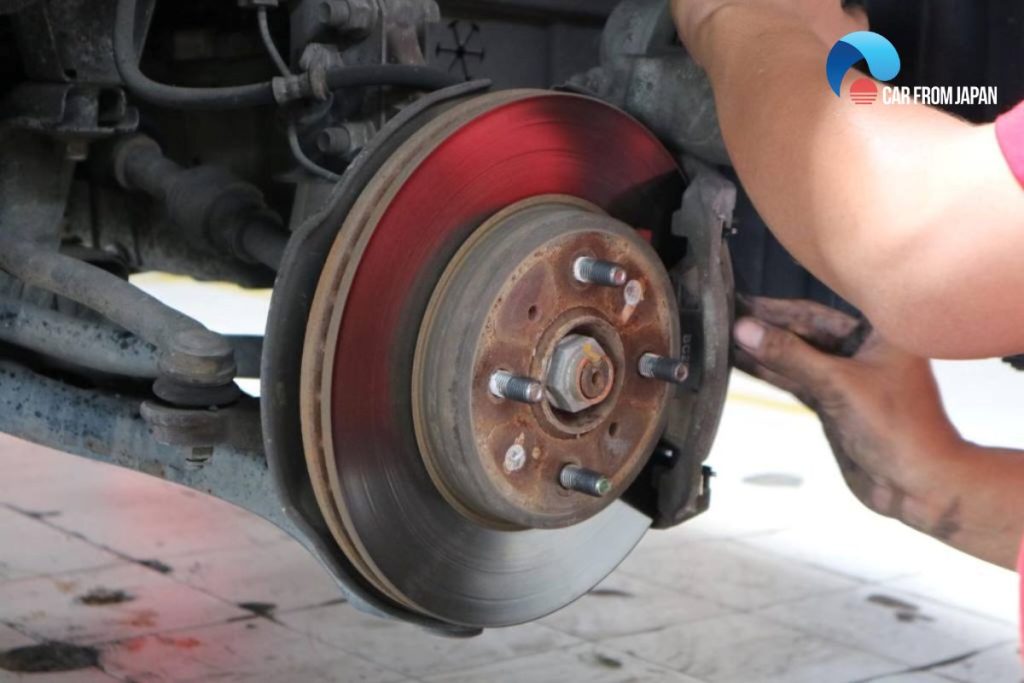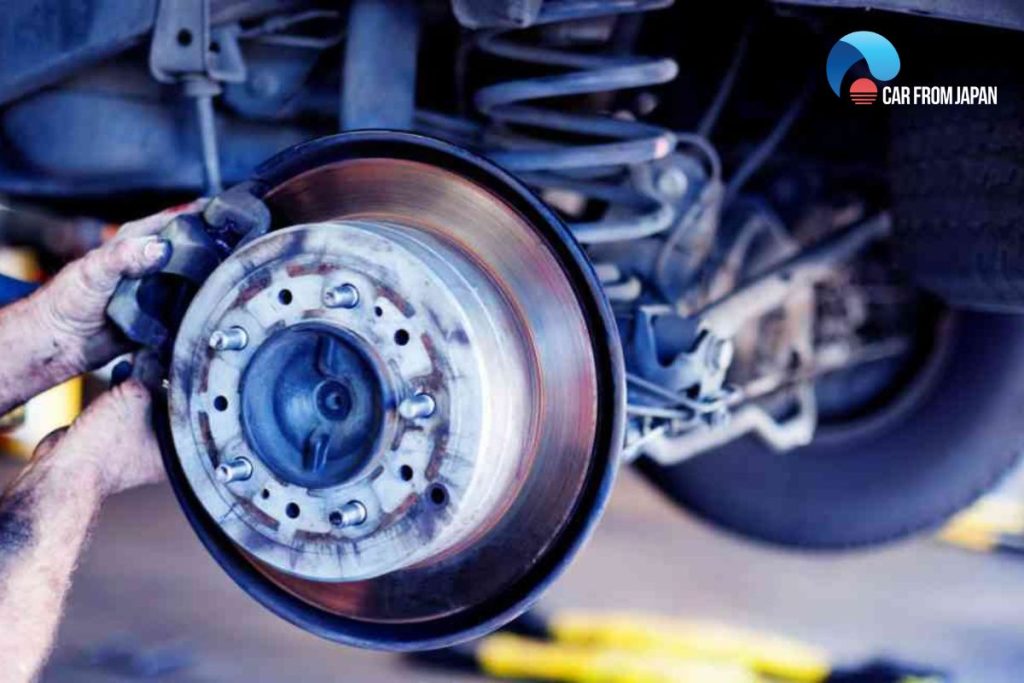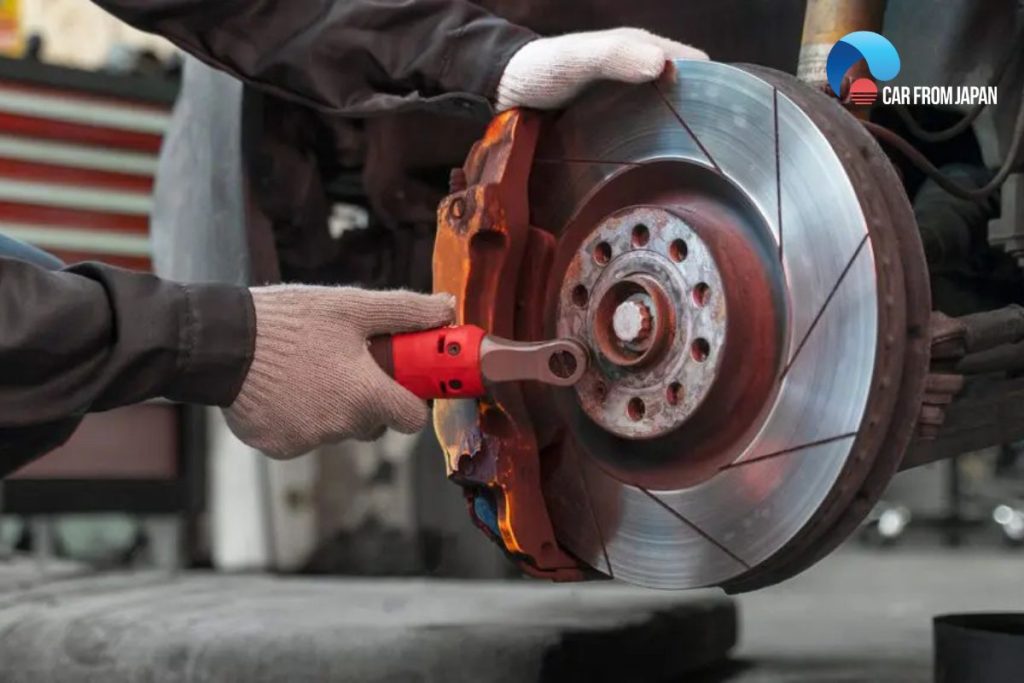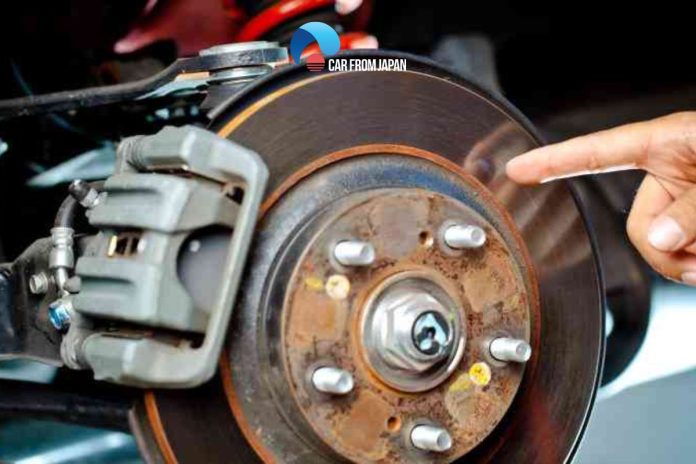Are squealing brakes at low speed a serious problem? First of all, brakes should not squeak constantly, especially when you are driving a new car.
But there are a few reasons for new brakes to behave that way and you should take them seriously. In fact, any problem related to brakes should be taken seriously because it is a safety issue.
Contents
- Squealing Brakes At Low Speed: Why Does It Happen?
- Is There A Way To Stop The Noise?
- How To Prevent Squealing Brakes At Low Speed Issue?
- FAQs on Squealing Brakes At Low Speed
- Is it safe to drive with noisy brakes?
- How long can squeaky brakes be tolerated?
- Do low-cost brake pads squeal?
- How can you extend the life of the brakes?
- Can you use WD40 on my squealing brakes?
- Why do brand new brakes squeal at low speeds even though they’re just installed?
- Are ceramic pads are more likely to squeal than semi-metallic ones?
- Can mismatched brake pads and rotors cause squealing?
- Final Words
Squealing Brakes At Low Speed: Why Does It Happen?
High-frequency vibration
If you look into the owner’s manual of your vehicle, you will find that the squealing noise is a result of the high-frequency vibration caused by the rubbing of the brake pads against the rotating disc.
The vibration is unavoidable in this case because the caliper keeps the pads fastened against the disc.
There are a few metrics that can affect the frequency and intensity of the vibration. It depends on the road conditions and weather conditions like humidity and temperature. It can increase if a road is particularly muddy or dusty.

See More: Removing Brake Dust From Car Wheels
Brake Condition
The condition of the brake pad material is another thing that determines the vibration level. For example, you will hear more squealing if the material is damaged or worn out.
There could be a few other minor reasons for the squealing noise. It can happen if a stone is stuck in the brakes. It goes away on its own most of the time.
You can also do a pressure wash to make stuck stones and dirt loose and fall off. If the noise still lingers, you have to check the brake rotor and pads.
Brake Pad Material
Sometimes, the squealing brakes at low speed could be the result of the materials used in the brake parts.
For example, the Subaru Tribeca creates a squealing noise because of the friction between brake parts made of metal and synthetic material.
New Brake Installation
In some cases, the problem arises after the installation of new brakes. It happens because some dealerships and auto repair shops don’t change the old glazed rotors when installing new brake pads.
The servicing should include at least cleaning the rotors if not replacing them to prevent such noises.
Lack of Lubrication
Moreover, squealing may be caused by a lack of lubrication at the contact points between the shoes and the drum if your vehicle uses drum brakes. The shoes begin to scrape against the backing plate without lubrication, generating a scream.
Look for traces of this type of scraping where the bare metal is exposed to determine where the problem is.
It is as simple as putting brake lubricant to the backing plate where the piston meets the shoes to prevent or fix noisy drum brakes.

Braking Style
Another cause for squealing brakes at low speed issue is your braking style that gradually harms the braking system.
Repeated harsh and quick braking, especially at high speeds, can create excessive heat, resulting in a smooth, hard glaze on the surface of your brake pads.
Glazing can also occur as a result of riding the brakes downhill, with the persistent friction generating a temperature surge that surpasses the limitations of standard brake pads.
When brake pads get glazed, they lose their ability to provide the friction required to stop the car. They might also break or crack. As a result, you’ll need to replace them.
Moisture
If you wake up to an unusual noise, it’s conceivable that it’s totally normal – especially if your automobile has been exposed to rain, snow, or humidity overnight. When moisture accumulates on your brakes, a thin film of rust can readily form on the rotors.
When you press the brakes, you may hear a grinding or screaming sound. Fortunately, everyday driving may generally remove the rust accumulation. You may also try parking your car indoors to keep moisture from gathering on your brakes.
Is There A Way To Stop The Noise?
What can you do to stop squealing brakes at low speed? Some people think that securing the pads more tightly onto the caliper is the solution. But it will only make the noise louder.
Changing the brake pads and rotor is a good solution if the materials of these parts are worn out. Be sure of excessive damage or wear on the pads if you find brake pad dust on the wheels.
Replacing the pads is a must if their remaining usable lining is too thin to last the next servicing.

You can also isolate the vibration and thereby decrease the noise by changing the pad shims and applying high-temperature grease between the caliper and pads.
Shims are a rubber adhesive or thin metal pads that act as a buffer between the brake caliper and the pads. They correct the small differences between these components to prevent possible squealing brakes at low speed.
How To Prevent Squealing Brakes At Low Speed Issue?
Proper brake pad selection and installation
High-quality ceramic or semi-metallic brake pads are less prone to squealing compared to cheaper organic options.
Ensure the pads are the correct fit for your vehicle and installed properly, as incorrect installation can lead to uneven wear and noise.
Applying brake grease to the back of the pads and contact points with the calipers, along with using shims, can further dampen vibrations and minimize squealing.
Quick inspection
If you’ve tried the previous steps and the squealing persists, seek professional help ASAP. This ensures any potentially serious brake problems are addressed promptly and correctly.
Check brake rotor condition
Resurfacing the rotors can often smooth out imperfections, but if they’re worn beyond a safe limit, replacement is necessary.
Notice to regularly cleaning the rotors to remove rust, debris, and brake dust buildup can also help prevent noise.
Detech caliper and hardware issues
Check that the calipers are moving freely and not sticking, as this can cause uneven pad wear and squealing. Lubricating the caliper slide pins ensures smooth movement and even pad pressure.
Inspecting the brake hardware, including anti-rattle clips and springs, and replacing any damaged components.
Consider environmental factors
Sometimes, environmental conditions can contribute to brake squeal. Moisture, especially in damp or humid weather, can cause a temporary squealing sound.

FAQs on Squealing Brakes At Low Speed
Is it safe to drive with noisy brakes?
If your brake shoes are squeaking, it may be due to a lack of lubrication at the contact areas where the shoes meet the drum, or to dust buildup inside the brake drum.
It is not unlawful to drive with noisy brakes, but it may raise safety concerns.
How long can squeaky brakes be tolerated?
It is usual for new rotors or brake pads to squeal during the first few days of use before they are entirely broken in.
If the squeaking hasn’t ceased after a few days, you should get your brakes checked out by a specialist.
Do low-cost brake pads squeal?
Cheaper brake pads often include more metal. As a result, bigger particles of metal appear on the brake pad surface.
These metal fragments can produce high-pitched squeaky brakes by dragging on the brake rotor.
How can you extend the life of the brakes?
These modest modifications in behavior and frequent maintenance services can help you extend the life of your brakes and save you money in the long run.
– Invest in good brake pads. simply put, you get what you paid for
– Coast lighten your load before using your brake pedal
– Avoid heavy or sudden braking
– Regularly flush your brake fluid
Can you use WD40 on my squealing brakes?
Although WD-40 is not an excellent lubricant, it does provide some lubrication. Using ANY lubricant on your brakes is a poor idea. In a few days, the WD-40 will disappear.
If you can’t wait that long, fully spray them with brake cleaner and let them dry.
Why do brand new brakes squeal at low speeds even though they’re just installed?
New brake pads may need a break-in or “bedding” period.
Until they properly mate with the rotor surface, slight squealing, especially at lower speeds, is common.
Are ceramic pads are more likely to squeal than semi-metallic ones?
Yes, ceramic pads tend to be quieter overall but can produce high-pitched squeals at low speeds due to their hardness and low-friction characteristics under light pressure.
Can mismatched brake pads and rotors cause squealing?
Yes. Not all pads are compatible with all rotor types.
Using a pad compound not suited for your specific rotors can lead to squealing, especially at light braking forces.
Check out this video from Junky DIY guy to learn more about squeaky disk brakes and drum brakes and how to fix them!
Final Words
After reading this piece of information, hope you’ll, understand more about the squealing brakes at low speed and some related issues.
For more Car maintenance tips, follow Car From Japan today!



